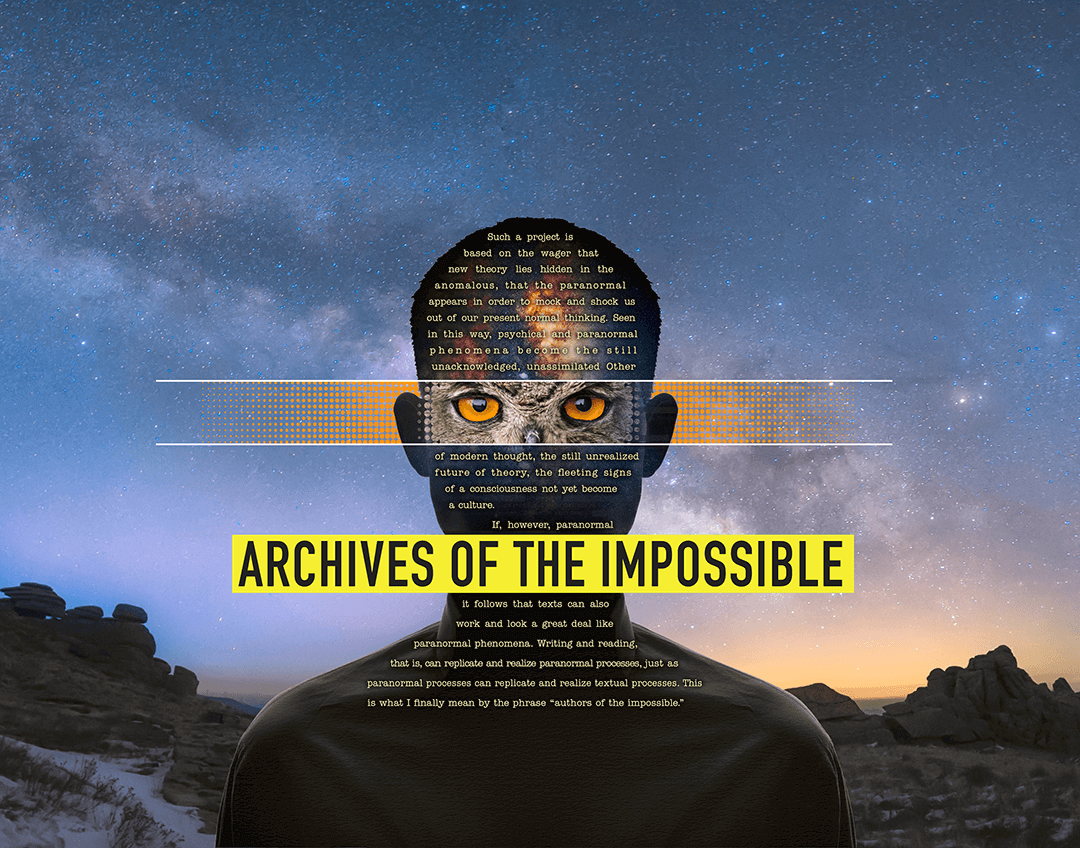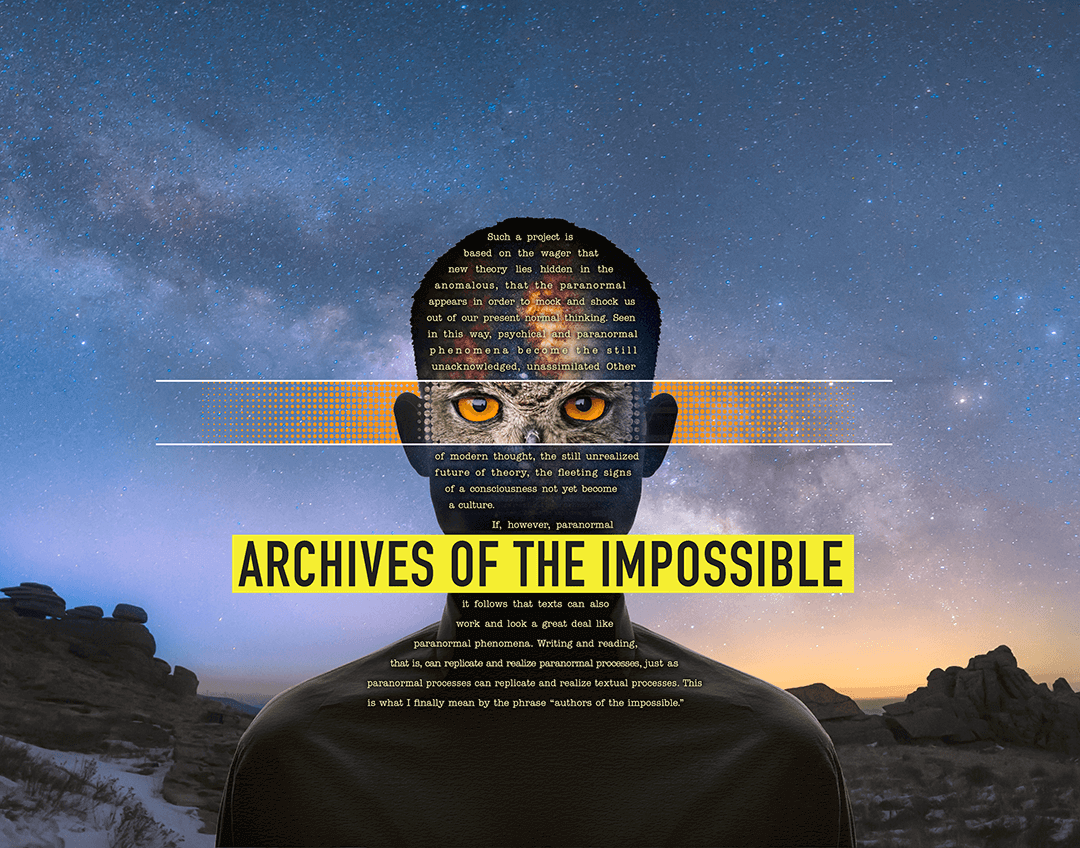
It all started with a conversation during a ride to the airport in December 2014. Jeffrey Kripal, Rice University’s J. Newton Rayzor Professor of Religion, was wrapping up a trip to Berkeley, California, where he’d spent time with Jacques Vallée. Vallée, a French-born American astronomer and computer scientist whose work inspired Steven Spielberg’s “Close Encounters of the Third Kind,” was concerned about the potential loss or commercialization of his research.
“He asked me if I could help him place his files and correspondence in a university archive of some kind,” Kripal said. “I immediately thought, ‘I wonder if Rice can do this?’”
Kripal, who’d released “Authors of the Impossible” in 2010, worked with Rice’s special collections director to create and host the Archives of the Impossible, a collection of accounts detailing the supernatural.
“The basic idea is that these are things that aren’t supposed to happen but do,” Kripal said. “Human beings are experiencing these impossible things, and they’ve been reporting them for as far back in history as we can see.”
Rice’s connection to space exploration, notably its historical ties to NASA , made it an apt home for Vallée’s archives, fitting within the university’s legacy of scientific inquiry and discovery. After years of negotiations, Vallée visited Rice to give a lecture and formally begin the donation.
Inspired by this successful collaboration, Kripal extended a similar invitation to Whitley Strieber, a renowned horror and science-fiction writer known for his groundbreaking work on abduction experiences, including the widely read “Communion.” Strieber’s extensive collection, along with contributions from physicist Ed May, added to the growing Archives of the Impossible.
“Everyone in this field who learned about the archives wanted to donate their life’s work to it,” Kripal said. “It’s been a kind of embarrassment of riches.”
Now approaching 10 years since that airport dropoff, the archives consist of 15 separate collections, one of the most recent coming from John E. Mack, a Harvard Medical School psychiatrist who investigated roughly 100 cases of alien abduction, conducting hundreds of hours of interviews. His gift to the archives consisted of 150 boxes, which translates into 450 linear feet of records and files.
“Every collection we accept represents hundreds of hours for archivists along with delivery and storage,” Kripal said.
That’s why he works so closely with Amanda Focke, Rice’s head of special collections at the Woodson Research Center (WRC).
“We do a lot of collecting of archival materials that support faculty interest,” Focke said, adding that Rice undergraduate and graduate students have helped process the archives’ gifts from Day 1. “The archives contain many thousands of documents in the form of books, journals, photographs, slides, reports, meeting notes and letters.”
After working with the WRC and Kripal for several years to transfer and digitize the Mack donation, Karin Austin officially joined Rice as the project manager of the archives in April 2024.
Austin worked with Mack in his research, eventually becoming his personal assistant. After his accidental death in 2004, she played a pivotal role in assisting his family with the closing of his estate, which involved managing various projects related to the administration of his personal affairs.
“Archives of the Impossible is presently undertaking a two-year meta-data research study in collaboration with the John Mack Institute,” Austin said. “We will anonymize and analyze various archival collections related to ‘alien abduction,’ a phenomenon that peaked in the latter decades of the 20th century. This study will be the first of its kind in terms of methodology, scope and scale.”
Austin added that the study will be undertaken with broad interdisciplinary oversight and the intention to produce whitepapers that offer new insight into a phenomenon that has been largely ignored or misunderstood by science and academia for the past 30 years.
“The study is significant and some might say long overdue,” Austin said. “I couldn’t be happier for the opportunity to work with Jeff Kripal, Amanda Focke and a number of admirably dedicated Rice students on this project. It’s truly a once-in-a-lifetime experience and an honor.”
They’ve also inspired two international Archives of the Impossible conferences hosted at Rice, lauded by Dean of Humanities Kathleen Canning as “the largest, most ambitious and most transgressive in its engagement with these authors and Archives of the Impossible that our school has probably ever hosted.” Plans for a third conference in 2025 are currently in the works.
The archives involve the whole university, Kripal pointed out. They sit in the Department of Religion, but cases involve discussions of physics, philosophy, genetics, anthropology, history, art, astronomy and biology.
“To study the impossible is to study everything,” Kripal said.
As the archival process continues, Kripal said he and his team eagerly anticipate welcoming scholars and students to delve into these intriguing materials in search of truth and understanding.
“The archives are open for research,” Focke said. “Whether you’re a skeptic or a believer, there’s something in these archives that will spark your imagination.”
That may be why they’ve been such a draw to filmmakers. Half a dozen production crews have visited the archives at Rice over the past few years. They’ve been joined by people from all over the world.
“Some people are just curious. Some people are scholars in different fields, such as psychology, physics or art,” Focke said, adding that others are people who experienced paranormal phenomena themselves. “They come to the archives because they want to connect with them.”
Impossible events, Kripal explained, happen far more often than we believe.
“They are extremely common, and we only think that they’re rare because our culture suppresses them and says that they don’t happen when they do,” he said. “Our collections are very much around human witnesses or human experiences.”
Those experiences, now documented and secured in the archives, will help inform future generations about the impossible.
“The goal of it is to be intergenerational. Other generations will follow us and hopefully they’ll use this material in a creative way,” Kripal said. “That’s why you collect it in an archive: to help people engage with it in the present and in the future.”

